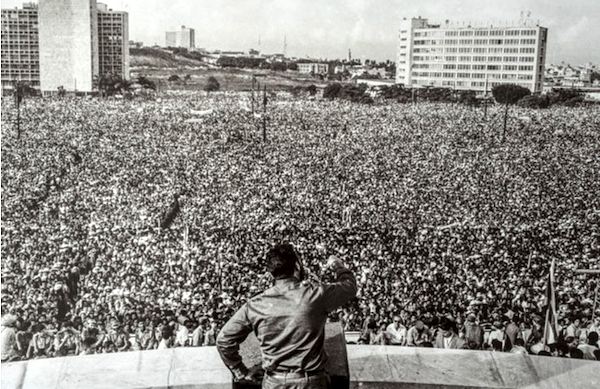Today marks the beginning of Fidel Castro’s centenary—a hundred years since the birth of the historic leader of the Cuban Revolution. As we enter this centenary period, we do so not with statues or monuments, for Fidel himself rejected such commemorations. Instead, we honor him in the most profound way possible: by continuing the struggles to which he dedicated his life—against exploitation, imperial domination, and injustice; for socialism, peace, dignity, and the full emancipation of humanity.
His legacy is not entombed in stone, but alive in the trenches of resistance across the globe. Fidel does not require marble or bronze to be remembered. From the youth marching in defence of the planet, to communities fighting for healthcare and housing, to movements resisting settler colonialism and racial capitalism, Fidel is there—present in spirit and example. He lives in every act of courage that dares to imagine and build a world founded on human dignity.
More than a political leader, Fidel was a revolutionary in the fullest sense of the word: someone who not only dreamed of a better world but organized and mobilized the people to bring that dream into being.
With the triumph of the Cuban Revolution on January 1, 1959, Fidel and the Cuban people broke the chains of U.S. domination and opened a new chapter in the history of Latin America and the Global South. They showed that it was possible to seize control of a nation’s destiny and to place human needs above private profit.
Fidel’s leadership was always rooted in a deep ethical commitment to justice. His was a politics of principle—dignified, consistent, and unbending in the face of the most formidable enemies. Despite more than six decades of blockade, sabotage, and vilification, Cuba under Fidel remained steadfast: abolishing illiteracy, eradicating preventable disease, advancing gender equity, and offering sanctuary and solidarity to the oppressed—a revolution of principles, not privilege.
Fidel’s internationalism was never rhetorical. It was lived, practiced, and institutionalized. In southern Africa, Cuba played a crucial role the decisive defeat in Angola of the racist armed forces of the apartheid South African state, which led to the immediate independence of Namibia, accelerating the end of racist rule in South Africa.
Thus, Cuban medical brigades saving lives in Africa, Latin America, and even in wealthy nations like Italy during the COVID-19 pandemic are not anomalies—they are the natural outgrowth of the revolutionary principles Fidel instilled. From Angola to Haiti, Cuban internationalism has been a beacon of what human solidarity can look like in action.
We live in perilous times. Around the world, fascism rises, genocide is normalized and routinized, the gap between rich and poor ever deepens and widens, and the planet edges closer to ecological catastrophe. In the face of such crises, Fidel’s life and legacy illuminate a different path—one based not on accumulation and domination, but on solidarity, justice, and the flourishing of humanity.
His example calls on us not to despair but to organize, not to retreat but to resist, to struggle—to build the new world. In Fidel, we see the power of commitment fused with clarity of vision; the power of revolutionary love grounded in rigorous struggle.
Bertolt Brecht once wrote:
There are those who struggle for a day and they are good. There are those who struggle for a year and they are better. There are those who struggle many years, and they are better still. But there are those who struggle all their lives: These are the indispensable ones.
Fidel was, and remains, one of those indispensable ones. In today’s global context Fidel’s vision is not a relic of the past but a roadmap for the future: in a world adrift, a compass.
As we commemorate the 100th anniversary of Fidel’s birth, let it not be merely a remembrance, but a renewal of commitment. Let it inspire not nostalgia, but revolutionary responsibility.
This centenary must be a time to rekindle the fires of resistance, to deepen our internationalist commitments, and to build the better world Fidel knew was possible—and necessary.
Fidel is not a figure of the past. He is a living force in the present, guiding us toward a better future yet to be won.
We declare, with conviction and clarity:
¡Fidel Presente! ¡Hoy, mañana y siempre!
¡Hasta la victoria siempre!
¡Venceremos!
Isaac Saney is a Black Studies and Cuba specialist and coordinator of the Black and African Diaspora Studies (BAFD) program at Dalhousie University in Halifax, Nova Scotia
Source: Resumen Latinoamericano—English

